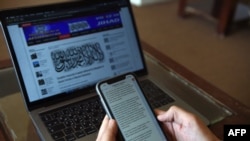An attack on an Afghan journalist, who was stabbed in Kabul on Sunday, has rattled the country's media.
Jawed Yusufi, a reporter for the independent outlet Ufuq News, was attacked about 6 p.m. local time in the predominantly Hazara section of western Kabul, according to his employer and local media advocates.
Three men armed with knives stabbed Yusufi multiple times, badly wounding him. He remains under special care at a local hospital, his employer reported on its website.
A spokesperson for the Taliban blamed robbers for the attack.
But Ufuq News said that the assailants did not take Yusufi's money or mobile phone, which suggests it was not a robbery.
The media outlet condemned the attack and called on the Taliban, media groups and international organizations "to take serious and practical steps in support of freedom of expression and the safety of journalists."
The attack on Yusufi came the same week that one journalist was beaten and had equipment confiscated and at least three journalists were detained.
A spokesperson for the Taliban interior ministry said in a video message that an investigation has been opened into the attack on Yusufi and other incidents targeting journalists.
Since seizing power, the Taliban have repeatedly pledged to respect Afghanistan's independent media.
But Hujatullah Mujadidi, head of the Afghanistan Independent Journalists Association, says the Taliban have failed to protect journalists.
"In every case, the Taliban promise to carry out an investigation, but so far, no case has been investigated," Mujadidi told VOA.
The New York-based Committee to Protect Journalists condemned the attack and called for the Taliban to hold those responsible to account.
"Prosecuting those who attack journalists is an essential measure to assure any semblance of press freedom in Afghanistan," CPJ's Asia coordinator Steven Butler said in a statement.
Media harassed
On December 11, Sayed Rashed Kashefi, a journalist for Kabul Times, a state-run English-language newspaper, was detained and beaten by what he said were Taliban forces.
At the time, he was photographing humanitarian aid distribution in the city.
Kashefi told the local TOLOnews channel that the attackers confiscated his equipment and asked where he worked.
Separately, journalists were detained in Kabul, Mazar-i-Sharif, and Kunduz in the past week, according to Mujadidi.
Faisal Noori, a journalist in the northern city of Kunduz, was taken by Taliban intelligence officials from his home and interrogated for hours.
In a Facebook post, Noori wrote that the incident had resulted from a "misunderstanding," but he complained about forces entering his house without permission and treating him like a criminal.
"The events of the past week, particularly the illegal detentions of journalists, have demoralized journalists," Mujadidi said. "Attempts to restrict freedom of expression represent a blow to the Afghan media community."
Since the Taliban took power in August, media rights groups have reported dozens of cases of journalists being detained or beaten while covering protests and other events.
The Taliban have circulated media guidelines that reporters say amount to an attempt to control the media, and the International Federation of Journalists estimates that at least 150 media outlets have closed.






